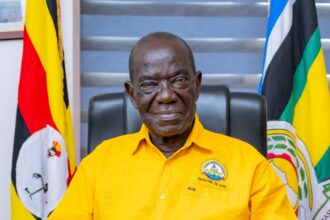The National Unity Platform (NUP) has taken daring steps to recall Hon. Mathias Mpuuga from the Parliamentary Commission due to accusations of corruption, dishonesty, and misuse of office, marking a recent change in the political scene. But this action’s legality has generated a contentious discussion, paving the way for a possible legal conflict.
In response to serious charges of misbehavior, the NUP decided to recall Hon. Mathias Mpuuga from the Parliamentary Commission, according to a statement released on Friday by interim president Dr. Lina Zedriga Waru. The decision was made in response to allegations that Mpuuga and other parliamentary commissioners had improperly given themselves large sums of money as “Service Awards,” which was seen to be against the party’s goals and principles.
In her statement, Dr Zedriga asserts that the party considered Mpuuga’s reply inadequate, especially as it neglected to address the specific charges leveled against him, even though he had responded to the National Executive Committee’s (NEC) request for an explanation of his actions. NEC decided to remove Mpuuga from the Parliamentary Commission as a result, and Hon. Zaake Francis Butebi was proposed to take his place.
However, Chris Obore, the Parliamentary Director of Communication and Public Affairs, has questioned the validity of the NUP’s decision. Obore argues that the required clauses found in Rule 110 of the Rules of Procedure of Parliament control the removal of a Commissioner may not favor NUP’s prayers. Obore states that in order to carry out this procedure, a written notice signed by at least one-third of the Parliament’s voting members must be used to launch a motion for a resolution to remove a Commissioner.
Obore’s explanation highlights the formal obstacles that NUP needs to get beyond in order to remove Mpuuga. A motion for removal would require the support of at least 143 members to initiate it and a subsequent vote of at least 265 members in favor of the removal, as there are 529 voting members of Parliament.
“By close of business today the Clerk had not received any notice to that effect.
The voting members of Parliament are 529.Therefore one third of all voting Members of Parliament is 143.And a half of all voting members of Parliament would require 265 members voting in favor of the removal.Therefore Removing Hon.Mpuuga as a Commissioner is a non- starter.It is VOID ABNITIO,” he said.
Meanwhile, the recall attempt of Mpuuga from the Parliamentary Commission appears to be problematic as the legal complexities surrounding parliamentary procedures become apparent. However, NUP has demonstrated it’s strong stand against the alleged misbehavior despite the presence of the substantial procedural obstacles in the way of Mpuuga’s termination.
Nevertheless, the conflict between political will and legal requirements paves the way for an interesting legal struggle with broad ramifications as interested parties await additional developments.
Mpuuga’s current situation can act as a trigger for a careful examination of the Parliamentary Rules of Procedure. This analysis may seek to strengthen safeguards that protect the integrity of a political party’s policy within the legislative branch. Legislators could work to improve accountability, openness, and party mandate compliance by resolving any gaps or ambiguities that might have contributed to Mpuuga’s problem.
These modifications could provide greater clarity regarding party discipline, voting procedures, and the handling of intra-party conflicts. This would support the development of a stronger democratic framework in the legislative context.
Do you have a story in your community or an opinion to share with us: Email us at Submit an Article









